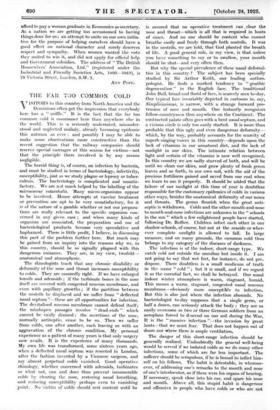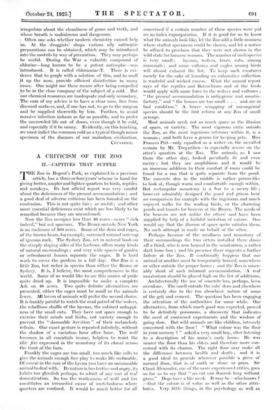THE FAR TOO COMMON COLD
NTISITORS to this country from North America and the Dominions often get the impression that everybody here has a " sniffle." It is the fact that the far too common cold is commoner here than anywhere else in the world. This is a seriously underrated, misunder- stood and neglected malady, already becoming epidemic this autumn as ever : and possibly I may be able to make some observations more constructive than the recent suggestion that the railway companies should reserve special carriages at this season for victims—not that the principle there involved is by any means negligible.
The horrid thing is, of course, an infection by bacteria, and must be studied in terms of bacteriology; infectivity, susceptibility, just as we study plague or leprosy or tuber- culosis. The bacteriology is complicated and unsatis- factory. We are not much helped by the labelling of the micrococcus catarrhalis. Many micro-organisms appear to be involved. Hence attempts at vaccine treatment or prevention are apt to be very unsatisfactory, for it is of the nature of a gamble whether or not our prepara- tions are really relevant to the specific organism con- cerned in any given case ; and when many kinds of organism are associated, the preparation and use of bacteriological products become very speculative and haphazard. There is little profit, I believe, in discussing this part of the problem further here. But much may be gained from an inquiry into the reasons why we, in this country, should be so signally plagued with this dangerous nuisance. They are, in my view, twofold— anatomical and atmospheric.
The rhinologists teach that any chronic disability or deformity of the nose and throat increases susceptibility to colds. They are assuredly right. If we have enlarged tonsils and adenoids ; if the turbinate bones in the nose itself are covered with congested mucous membrane, and even with papillary growths ; if the partition between the nostrils be displaced and we suffer from " deflected nasal septum "—these are all opportunities for infection. The devitalized mucous membrane cannot defend itself; the misshapen passages involve " dead-ends " which cannot be easily drained ; the secretions of the nose, normally antiseptic, cease to be so. Then we suffer from colds, one after another, each leaving us with an aggravation of the chronic condition. My personal experience as a patient of many years is that only surgery now avails. It is the experience of many thousands. My own life was transformed, some sixteen years ago, when a deflected nasal septum was resected in London, after the fashion invented by a Viennese surgeon, and my almost perpetual colds vanished. Good operative rhinology, whether concerned with adenoids, turbinates or what not, can and does thus prevent innumerable colds by clearing the nose, restoring nasal breathing, and reducing susceptibility perhaps even to .vanishing point. No victim of colds should rest content until he is assured that no operative treatment can clear the nose and throat—which is all that is required in hosts of cases. And no one should be content who cannot breathe easily and freely through both nostrils. It was in the nostrils, we are told, that God planted the breath of life. A good general rule, in my view, is that unless you have something to say or to swallow, your mouth should be shut—and very often then.
But why the special prevalence of these nasal deformi- ties in this country ? The subject has been specially studied by Sir Arthur Keith, our leading anthro- pologist. He finds a marked tendency to " gnathic degeneration " in the English face. The traditional John Bull, broad and florid of face, is scarcely seen to-day. Our typical face invariably depicted in cartoons in, say, Simplicissimus, is narrow, with a strange forward pro- trusion of nose and mouth. One instantly recognizes fellow-countrymen thus anywhere on the Continent. The contracted palate often goes with a bent nasal septum, and a vicious circle is only too easily started. It is more than probable that this ugly and even dangerous deformity— which, by the way, probably accounts for the scarcity of superb singing voices in this country—depends upon the lack of vitamins in our unnatural diet, and the lack of sunlight in our skies. The intimate relation between light and certain of the vitamins is now well recognized. In this country we are sadly starved of both, and will be until we clean our skies, and grow plenty of fresh green leaves and so forth, in our own soil, with the aid of the precious fertilizers gained and saved from our coal when we learn to use it properly. It should be added that the failure of our sunlight at this time of year is doubtless responsible for the customary epidemics of colds in various other ways, besides the anatomical deformity of our noses and throats. The germs flourish when the great anti- septic is withdrawn. Colds and the other mouth-and-nose to mouth-and-nose infections are unknown in the " schools in the sun " which a few enlightened people have started, following Dr. Rollier. Children infect each other in our shadow-schools, of course, but not at the seaside or wher- ever complete sunlight is allowed to fall. In large measure, and on many grounds, the common cold thus belongs to my category of the diseases of darkness.
The infection is of the indoor, short-range type. We catch cold not outside the omnibus but inside it. I am not going to say that wet feet, for instance, do not pre- dispose. There doubtless is a small modicum of truth in the name " cold " ; but it is small, and if we regard it as the essential fact, we shall be betrayed. Our usual indoor winter atmosphere is warm, stagnant, humid. This means a warm, stagnant, congested nasal mucous membrane—obviously more susceptible to infection. But this is also just where the infection abounds. No bacteriologist to-day supposes that a single germ, or half a dozen, can seriously attack the body ; they are as easily overcome as two or three German soldiers from an aeroplane forced to ch.scend on our soil during the War. It is the " massive infection "—the invasion by great hosts—that we must fear. That does not happen out of doors nor where there is ample ventilation.
The danger of this short-range infection should be generally realized. Undoubtedly the general well-being would be served if we isolated colds as we do many other infections, some of which are far less important. The sufferer should be scrupulous, if he is bound to inflict him- self on his fellows. The habit is detestable, in whomso- ever, of addressing one's remarks to the mouth and nose of one's interlocutor, as if these were his organs of hearing. If necessary, speak close into his ear, and spare his nose and mouth. Above all, this stupid habit is dangerous and offensive in people who have colds or who are not scrupulous about the cleanliness of gums and teeth, and whose breath is malodorous and dangerous.
i Often one asks whether modern chemistry cannot help us. At the druggists' shops various oily antiseptic preparations can be obtained, which may be introduced into the nostrils by way of precaution. They may perhaps be useful. During the War a valuable compound of chlorine—long known to be a potent antiseptic—was introduced. It is called chloramine-T. There is evi- dence that to gargle with a solution of this, and to snuff It up the nose, provide efficient disinfection in many cases. One might use these means after being compelled to be in the close company of the subject of a cold. But tour chemical resources are inadequate and only secondary. The sum of my advice is to have a clear nose, free from 'diseased surfaces, and, if one has not, to go to the surgeon and be supplied therewith by him. Further, to avoid massive infection indoors as far as possible, and to prefer the uncrowded life out of doors, even though it be cold, and especially if it be sunny. Evidently, on this teaching, .we must indict the common cold as a typical though minor specimen of the diseases of our malurban civilization.
CRUSADER.































































 Previous page
Previous page